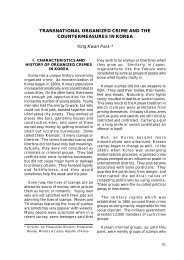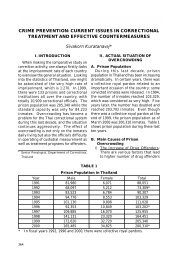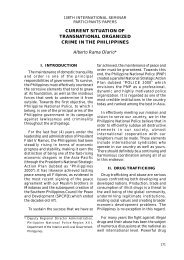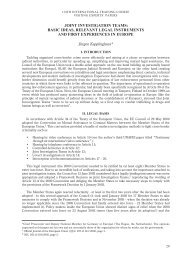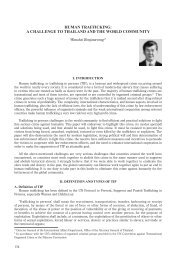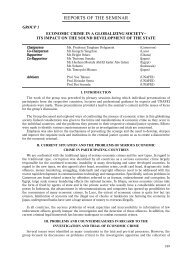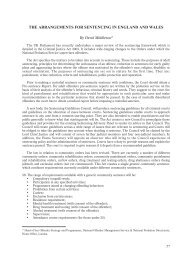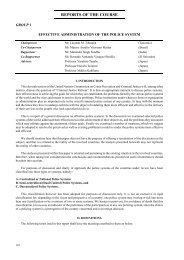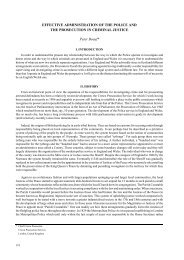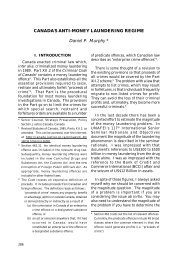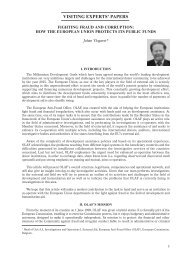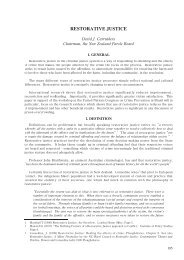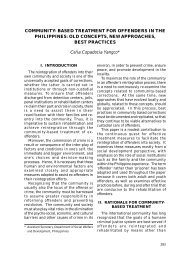THE PUBLIC PROSECUTION OFFICE IN GERMANY : LEGAL ...
THE PUBLIC PROSECUTION OFFICE IN GERMANY : LEGAL ...
THE PUBLIC PROSECUTION OFFICE IN GERMANY : LEGAL ...
Create successful ePaper yourself
Turn your PDF publications into a flip-book with our unique Google optimized e-Paper software.
58<br />
<strong>THE</strong> <strong>PUBLIC</strong> <strong>PROSECUTION</strong> <strong>OFFICE</strong> <strong>IN</strong> <strong>GERMANY</strong> :<br />
<strong>LEGAL</strong> STATUS, FUNCTIONS AND ORGANIZATION<br />
Eberhard Siegismund*<br />
I. <strong>IN</strong>TRODUCTION<br />
Where the media in Germany are concerned with legal matters and problems, it is particularly the criminal law that<br />
is the focus of public attention. Serious news magazines regularly report on spectacular criminal offences and on the way<br />
in which they are dealt with by the investigating authorities and the courts. Thus, a few years ago, a murder case with a<br />
policeman as the victim, moved centre-stage – a trial that went on for months; this was followed by the Mainz child<br />
molester case – a case that made legal history because it caused Parliament to change the law and establish video<br />
examinations as part of criminal procedure; and now we have a case against three right-wing radicals in an East German<br />
town, who set fire to an apartment block several years ago, thereby endangering the lives of a large number of asylum<br />
seekers.<br />
Whilst it is occasionally apparent that an effort is being made to report objectively on the course of such trials, one<br />
cannot fail to recognise a tendency towards critical reporting, indeed in two respects: on the one hand, public attention<br />
is drawn to judicial sanctioning practice, which is sometimes felt to be too lenient – especially with regard to young<br />
criminal offenders; on the other hand, the criminal prosecution practice of the police and the public prosecution office is<br />
often eyed very critically.<br />
Even though it deserves to be called – actually by dint of statute, and this is something I will be coming back to later<br />
– the “most objective authority in the world”, the public prosecution office is, however, not infrequently said, as the<br />
“cavalry of the law”, to demonstrate a certain “dashing spirit” and is thus thought to be blind in its enthusiasm for<br />
prosecution. Public prosecutors, although said to investigate swiftly and in a straightforward manner, are said to do so,<br />
however, one-sidedly to the accused’s disadvantage, without any sure instinct and without the requisite critical distance.<br />
Charges of this kind were heard again just recently in petitions addressed to the Federal Ministry of Justice in Berlin,<br />
after a young man had been convicted of attempted murder and sentenced to a long term of imprisonment in a trial based<br />
on circumstantial evidence. Here the victim was a policewoman; her lover and her father, who were also among the<br />
suspects, were also policemen. From the media vantage point, the investigating authorities had erroneously concentrated<br />
their inquiries on the person who was subsequently convicted and – as they were professional colleagues – had spared<br />
the other two suspects further investigations in line with the principle that birds of a feather flock together. An interesting<br />
little detail here: after the Federal Court of Justice had dismissed the appeal on points of law only against the judgment<br />
of the lower court, composed of three professional and two lay judges, the convicted person’s application for the reopening<br />
of the proceedings has now been granted.<br />
Occasionally, but only very seldom, the charge has also been levelled in the press that the public prosecution office<br />
is kept on a tight rein by the Government. It is said to be subjected to political influence in its investigations, perhaps<br />
with the result that people close to the Government are not being prosecuted with the requisite vigour. In Germany,<br />
however, these are matters that do not fall within the competence of the Federation but rather within the competence of<br />
the Länder, for in Germany the organization of the justice system is fundamentally a matter for the constituent states of<br />
the Federation, i.e. the Bundesländer.<br />
Following a brief introductory historical overview, I would now like to acquaint you with the legal status and functions<br />
of the public prosecution office as well as with organizational questions. At this point I will be less concerned with<br />
scientific discourse than with a practice-oriented presentation.<br />
II. <strong>THE</strong> <strong>LEGAL</strong> STATUS OF <strong>THE</strong> <strong>PUBLIC</strong> <strong>PROSECUTION</strong> <strong>OFFICE</strong> <strong>IN</strong> <strong>GERMANY</strong><br />
The status and functions of the public prosecution office are laid down by statute, i.e. by the Courts Constitution Act<br />
– in its sections 141 to 151 – and by the Code of Criminal Procedure – for instance, in sections 158 to 163 – but not in<br />
* Deputy Director General in the Judicial System Division,<br />
Federal Ministry of Justice,<br />
Berlin, Germany
120TH <strong>IN</strong>TERNATIONAL SENIOR SEM<strong>IN</strong>AR<br />
VISIT<strong>IN</strong>G EXPERTS’ PAPERS<br />
detail and certainly not conclusively. The provisions in the Courts Constitution Act – which I shall refer to as the CCA<br />
–on the status of the public prosecution office rather tend to have the character, at least in part, of guiding principles or<br />
of organizational principles, whereas the important allocations of function in the Code of Criminal Procedure are mainly<br />
drafted in the form of general clauses.<br />
Nevertheless, in Germany we have had largely positive experience with this system of provisions and so, in October<br />
1990 when East and West Germany were reunified, we also transferred this part of the law unchanged to the new<br />
Bundesländer.<br />
A. Historical Review<br />
In German criminal procedure the public prosecution office is a relatively young institution. The relevant provisions<br />
were conceived on the model in French criminal procedure. Until the beginning of the nineteenth century, France had an<br />
inquisitorial procedure conducted in secret and in writing.. After Montesquieu had extolled the virtues of English legal<br />
institutions as models for the constitution of the courts and for criminal procedure, these institutions were adopted,<br />
particularly the principle of ex officio prosecution, the parties’ duty to furnish proof, the principle of oral proceedings,<br />
the principle of proceedings in public, and, above all, trial by jury.<br />
The definitive element of French criminal procedure was a prosecution proceeding where the charges were preferred<br />
by a special state criminal prosecuting authority, i.e. a public prosecution office. Compared with the procedure in force<br />
in Germany, French procedural law displayed indisputable objective advantages, for in Germany proceedings before the<br />
criminal courts up to the mid nineteenth century were conducted in writing and in secret. The criminal courts were<br />
equipped with their own investigating staff – the court police. The court police were responsible for clearing up the facts<br />
of a case until they were “ripe” for final judgment by the court. There was hardly any control of the police, or none at<br />
all. Criminal court judges were reproached for “lack of diligence, bias and overweeningness”. Hence the Prussian King<br />
was initially concerned only with disciplining the courts and affording the state interest in imposing punishment greater<br />
chances of enforcement. It was, however, the more liberal elements in the Berlin Ministry of Justice who succeeded in<br />
developing a conception for reform in 1845: according to this conception, the public prosecutor was not only to act in<br />
the state’s interest but also to show equal concern for the defendant, i.e. for his defence. This was designed to obtain<br />
popular support for a novel institution, and to make it clear that the public prosecution office was now to be the custodian<br />
of the law, for the benefit of the defendant as well.<br />
The Ministry took an even greater step forward by making the decision to put the police under the control of the<br />
public prosecutor, for there was specific cause for concern that reasonable account was not being taken of the accused’s<br />
rights during police prosecution measures.<br />
The statue that came into force at the beginning of 1847 contained the following core provisions:<br />
• Public prosecutors were made subject to the official supervision of the Minister of Justice and to his instructions.<br />
• Courts were not allowed to intervene proprio motu, but only upon application by the public prosecution office.<br />
• Public prosecutors had to watch over compliance with statutory provisions in criminal proceedings. A public<br />
prosecutor had to take care that no guilty person escaped punishment and that the guiltless were not prosecuted.<br />
B. What is the Situation Like in Germany Today with Regard to the Public Prosecution Office, when Seen<br />
against the Backdrop of its Early Beginnings in Berlin?<br />
The modern view is that public prosecution offices are hierarchically structured, independent organs of the<br />
administration of criminal justice. They are on an equal level with the courts. What this means in detail is easier to<br />
understand when one knows how public prosecution offices are structured in Germany. The Federal Republic of Germany<br />
is a federal state. And because Judicial Power lies with the individual Bundesländer – 16 in all – we have independent<br />
Land public prosecution offices in each Bundesland.<br />
The public prosecution office is organized parallel to the courts, which means that the territorial competence of public<br />
prosecutors is governed by the territorial jurisdiction of the court where the public prosecution office has been established:<br />
section 143(1) of the CCA.<br />
59
60<br />
RESOURCE MATERIAL SERIES No. 60<br />
Section 141 of the CCA states that there should be a public prosecution office at every court. Hence, there is a public<br />
prosecution office at every Regional Court in the Länder that make up the Federal Republic of Germany, meaning a total<br />
of 116 public prosecution offices at the Regional Courts. As a rule, these public prosecution offices also carry out public<br />
prosecution functions at the Local Courts. They are subordinate to a regional public prosecution office established at<br />
every Higher Regional Court (sections 142 and 147 of the CCA), so there are a total of 25 regional public prosecution<br />
offices. The regional public prosecution offices are, in turn, subordinate to the respective ministers of justice of the<br />
Bundesländer: section 147 of the CCA.<br />
Example: There is one public prosecution office each at the Regional Courts in Bonn, Cologne and Aachen. These<br />
public prosecution offices are subordinate to the regional public prosecution office in Cologne. The regional public<br />
prosecutor there is subordinate to the Minister of Justice of the Land of North-Rhine/Westphalia in Düsseldorf.<br />
On the federal level, the Federal Public Prosecution Office exists parallel to the Federal Court of Justice. This authority<br />
is headed by the Federal Public Prosecutor General: section 142(1), no. 1, of the CCA; there are other federal public<br />
prosecutors assigned to him. On the one hand, the Federal Public Prosecution Office performs the classical functions of<br />
a “public prosecution office at the Federal Court of Justice”, i.e. it represents the prosecution in all cases that come before<br />
that court: section 135 and section 121(2) of the CCA. Section 142a of the CCA otherwise provides for special competence<br />
of the Federal Public Prosecution Office to act in cases of first-instance jurisdiction of the Higher Regional Courts (section<br />
122[1] and [2] of the CAA), i.e. particularly in cases of crimes against the state and of terrorist crimes as well as in other<br />
cases involving serious crime that goes beyond individual Länder borders. This means, for instance, that the intervention<br />
of the Federal Public Prosecutor General was called for on an exceptional scale after the events of 11 September 2001<br />
in New York.<br />
I still need to mention that in cases of “normal” delinquency there is no national public prosecution office operating<br />
throughout the Federation, since criminal prosecution is on principle a matter for the Länder. Thus there is no superior/<br />
subordinate relationship of any sort between the Federal Public Prosecution Office in Karlsruhe and the Länder public<br />
prosecution offices at the Higher Regional Courts and the Regional Courts. Nevertheless, in agreements reached by<br />
Länder ministers of justice, two institutions have been created that are competent in certain criminal prosecution matters,<br />
where such competence encompasses all the Länder:<br />
• One of these institutions is the Central Agency in Ludwigsburg, concerned with the registration and clearing up of<br />
cases of violent action perpetrated by the Nazis, and having the obligation to pass these cases, for the purpose of<br />
prosecution, to the public prosecution office at the court with local jurisdiction over the place where the perpetrator<br />
is living,<br />
• The other institution takes the form of a central agency for collecting evidence and documentation; this agency was<br />
established at the regional public prosecution office in Braunschweig where it is responsible for documenting violent<br />
action perpetrated by state organs of the former GDR, and here in particular homicides perpetrated at the border wall<br />
in Berlin, as well as on the inner German border; furthermore, physical assaults and deprivation of liberty for political<br />
reasons are also included in the agency’s documentation functions. However, apart from the homicide crimes,<br />
prosecution of the offences concerned is in most cases already barred by lapse of time (statute of limitations).<br />
III. FUNCTIONS OF <strong>THE</strong> <strong>PUBLIC</strong><br />
<strong>PROSECUTION</strong> <strong>OFFICE</strong><br />
To illustrate the public prosecution office’s status, it would seem expedient to look at its various functions in criminal<br />
proceedings.<br />
The public prosecution office has three main functions: It is<br />
• the “leader, so to speak, of the investigation proceedings”<br />
• the authority that conducts the prosecution in the intermediate proceedings and in the main proceedings, and<br />
• it is the authority that is responsible for execution of sentence in criminal proceedings, as well as the authority handling<br />
pardons in criminal cases.
120TH <strong>IN</strong>TERNATIONAL SENIOR SEM<strong>IN</strong>AR<br />
VISIT<strong>IN</strong>G EXPERTS’ PAPERS<br />
A. Leader of the Investigation Proceedings<br />
In investigation proceedings the public prosecution office has the sole power of indictment: section 152(1) of the<br />
Code of Criminal Procedure – which I shall now be referring to as the CCP. The principle of official prosecution, which<br />
is formulated as a legal norm here, means that criminal prosecution is fundamentally the duty of the state (acting for the<br />
community of law-abiding people), and not of the individual.<br />
1. The Principle of Mandatory Prosecution<br />
The public prosecution office shall, unless otherwise provided by law, be obliged to take action in relation to all<br />
criminal offences which may be prosecuted, provided there are sufficient factual indications: section 152(2) of the CCP.<br />
The principle of mandatory prosecution means a compulsion to prosecute any and every suspect, and, on fulfilment of<br />
all preconditions, to prefer public charges.<br />
With the public prosecution office’s monopoly over indictment, practical application is given to the principles of<br />
equality before the law (Art. 3 of the German Constitution) and of justice within the realm of possibility. The public<br />
prosecution office’s source of information is from receipt of information about a criminal offence or from an application<br />
for criminal prosecution (section 158[1] of the CCP) or from somewhere else – particularly from a police communication<br />
– regarding suspicion of commission of a criminal offence; this is the usual way in which the public prosecution office<br />
gets its information, for more than 80 % of criminal informations are laid with the police. The public prosecution office<br />
has to investigate the facts of a case for the purpose of deciding whether public charges are to be preferred; it either has<br />
to do this itself or through the police: sections 160(1) and 163 of the CCP.<br />
In its investigations the public prosecution office is bound to maintain absolute objectivity: hence it is required to<br />
ascertain not only incriminating but also exonerating circumstances (section 160[2] of the CCP) and its shall ensure that<br />
such evidence is taken the loss of which is to be feared. It is these provisions that gave rise to the familiar saying that the<br />
public prosecution office is “the most objective authority in the world”.<br />
2. The General Investigation Clause in Section 161CCP<br />
The statutory basis for the public prosecution office’s authority to conduct any kind of investigation, that is to say<br />
the core provision regulating investigation proceedings, is section 161(1) of the CCP:<br />
“For the purpose indicated in section 160(1) to (3), the public prosecution office shall be entitled to request<br />
information from all authorities and to make investigations of any kind, either itself or through the authorities<br />
and officials in the police force provided there are no other statutory provisions specifically regulating their<br />
powers. The authorities and officials in the police force shall be obliged to comply with the request or order of<br />
the public prosecution office, and they shall be entitled in this case to request information from all authorities”.<br />
This general investigation provision also forms the legal basis for those cases of interference with basic rights that<br />
are less intensive and are therefore not covered by a special statutory authority, such as for instance;<br />
• short-term monitoring,<br />
• the use of undercover investigators (i.e. police informers) or<br />
• the use of purchasers in a bogus sale.<br />
The important thing is that the public prosecution office can obtain information from public authorities, from other<br />
agencies or persons at any time. The authorities are obliged to give the public prosecution office the information in<br />
question, even where the requested information still has to be put together by collecting material, or where it has to be<br />
acquired from observation of official operations. The requested authority may only refuse to provide the information<br />
concerned if its provision will cause detriment to the welfare of the Federation or of a German Land, or would seriously<br />
endanger performance of public functions or would make such performance much more difficult.<br />
So far as the requested authority’s duty to provide information extends, the public prosecution office may also question<br />
the officials working for that authority or get them to submit the relevant documents . Information may also be requested<br />
from other agencies or persons. If such information is refused, a formal examination may be imposed, and in certain<br />
circumstances, surrender may be requested, or search and seizure ordered. The public prosecutor will regularly draw<br />
attention here to the conceivable types of possibility in order to lend emphasis to his request for information.<br />
61
62<br />
RESOURCE MATERIAL SERIES No. 60<br />
Pursuant to section 161a of the CCP the public prosecution office may formally question witnesses and experts for<br />
the purpose of the investigation. Upon being summoned, they are obliged to appear before the public prosecution office<br />
and to make statements on the subject matter or to render their opinion. If they are summoned only to appear before the<br />
police, they will not be under this obligation. Examination under oath is, however, reserved only for the judge.<br />
3. The Jurisdiction of the Investigating Judge<br />
If the public prosecution office considers a judicial investigation to be necessary it will have to make the relevant<br />
applications to the Local Court, to be decided by the investigating judge: section 162 of the CCP; what is meant here is<br />
particularly coercive measures, like a search (sections 102 et seqq. of the CCP), seizure (sections 94 et seqq. of the CCP)<br />
and remand detention (sections 112 et seqq. of the CCP). Under specific conditions certain coercive measures may also<br />
be ordered in exigent circumstances by the public prosecution office acting on its own (see e.g. section 105[1], first<br />
sentence, of the CCP for the search of private premises).<br />
Until about a year ago both the public prosecution office and the police with responsibility for conducting criminal<br />
investigations had become accustomed to relatively uninhibited application of the element of “exigent circumstances”,<br />
and they therefore made relatively generous use of the possibility, for instance, of searching people’s homes without a<br />
judicial decision to this effect, on the ground that the element of “exigent circumstances” had been found to pertain. But<br />
the Federal Constitutional Court brought this practice to an abrupt end with its decision of 20 February 2001. The principles<br />
guiding this decision may be set out as follows:<br />
The Constitution guarantees the inviolability of the home. Hence it is ensured that the individual has an<br />
elemental living space, having due regard to his human dignity. On his private premises he has the right to be left<br />
in peace. A search represents a serious interference with this constitutionally protected sphere of life. It is in line<br />
with the weight attached to such interference and with the constitutional importance of protecting private<br />
premises that the Constitution should, on principle, reserve the right of ordering a search for members of the<br />
judiciary.<br />
It is now the responsibility of all state organs to ensure that this judicial prerogative becomes effective in practice<br />
as a means of securing a elemental basic right. Both the courts and the criminal prosecuting authorities have to<br />
take action to counter any deficits in effectiveness. This means practical and organizational measures to create<br />
the conditions needed for judicial control that is actually effective. Only by doing this can there be suppression of<br />
the frequently criticised tendency on the part of the criminal prosecuting authorities towards excessive use of<br />
powers available in cases of urgency.<br />
Conclusion: It must remain absolutely exceptional for the investigating authorities to have competence in regard<br />
to searches of private premises.<br />
This decision of the Federal Constitutional Court is of very considerable importance in practice. It is now no longer<br />
sufficient if there is just pure speculation or just presumptions based on everyday criminalistic experience as the basis<br />
for assuming exigent circumstances. Exigent circumstances have to be established on concrete facts relating to the<br />
individual case. The mere possibility of losing evidence will not be enough. Hence the criminal prosecuting authorities<br />
must make a regular attempt to obtain an order from the competent court with jurisdiction before beginning a search.<br />
Only in extremely exceptional situations will they themselves be allowed to make the order in exigent circumstances<br />
without first trying to obtain a judicial decision. Not only do the investigating authorities have to take account of the<br />
Federal Constitution Court decision, so do the courts: they are required to set up an emergency or duty service in order<br />
to ensure that an investigating judge can be reached at any time.<br />
4. The Principle of Discretionary Prosecution<br />
The public prosecution office’s competence to terminate proceedings on discretionary grounds is such an everyday<br />
occurrence that one cannot imagine doing without it (sections 153 et seqq. of the CCP). These possibilities of terminating<br />
proceedings are indispensable particularly for the purpose of swift disposal of petty crime (shoplifting, fare dodging,<br />
negligent infliction of bodily harm). Here we are essentially looking at the following measures:<br />
• Termination by the public prosecution office, pursuant to section 153(1) of the CCP, where the perpetrator’s guilt is<br />
considered to be of a minor nature and there is no public interest in the prosecution (e.g. shoplifting by a first offender<br />
where the item stolen is worth up to 5 Dollars).
120TH <strong>IN</strong>TERNATIONAL SENIOR SEM<strong>IN</strong>AR<br />
VISIT<strong>IN</strong>G EXPERTS’ PAPERS<br />
• Termination, pursuant to section 153a of the CCP, where the perpetrator does not bear heavy guilt and where the<br />
conditions and instructions imposed on the accused are of such a nature as to eliminate the public interest in criminal<br />
prosecution (e.g. where there has been minimal bodily harm and the accused is willing to pay the victim a sum of<br />
money for pain and suffering).<br />
• Termination pursuant to section 154 of the CCP, or else limitation of criminal prosecution pursuant to section154a<br />
of the CCP in a case where several offences have been committed but where other offences committed by the same<br />
perpetrator in addition to the principal offence are no longer significant (on the grounds of procedural economy: the<br />
accused first steals a bottle of beer in a department store, and an hour later he commits a bank robbery; here the<br />
proceedings may be terminated in respect of the theft because a severe sentence is to be expected for the robbery).<br />
It follows from the plenitude of competence I have just outlined that the public prosecution office is rightly referred<br />
to as the “leader of the investigation proceedings”.<br />
5. Disposal of Cases by Public Prosecution<br />
If the public prosecution office has not brought the proceedings to a conclusion through application of the provisions<br />
I have referred to, or has terminated the proceedings for lack of evidence of commission of an offence, it will have three<br />
options at its disposal:<br />
• To start with, the public prosecution office may apply for issuance of a penal order if a main hearing does not seem<br />
necessary and a prison sentence is to be expected not exceeding one year (with suspension of sentence on probation).<br />
Penal order proceedings have developed into an extremely popular instrument for the public prosecution office;<br />
sanctioning is swift and economical in procedural terms, and it is less of a burden on the accused because he is<br />
spared a main hearing held in public. In 2001 approximately 500 000 penal orders were issued in Germany.<br />
• Secondly, the public prosecution office may make an application for a decision to be taken in an accelerated procedure<br />
if, given the simple factual situation or the clarity of the evidence, the case is appropriate for an immediate hearing.<br />
(maximum sentence of one year’s imprisonment).<br />
The accelerated procedure, a type of procedure that deserves support in the light of the view that punishment<br />
should, as far as possible, follow hot on the heels of the offence, has not yet developed its full potential in Germany.<br />
Practitioners are experiencing some difficulty with this procedure; it is mainly a matter of encountering<br />
organizational difficulties (at present also including co-ordination problems between the police and the public<br />
prosecution office), and this is preventing an increase in the number of cases here. In 2001 there were only 35,000<br />
cases where use was made of the option of following the accelerated procedure.<br />
• Thirdly, the public prosecution office may prefer charges. Whenever the investigations offer sufficient reason for<br />
preferring public charges, the public prosecution office must prefer such charges by submitting a bill of indictment<br />
to the court that has jurisdiction locally: section 170(1) of the CCP.<br />
Let me give you a few supplementary figures on operations conducted by the public prosecution office and on its<br />
work in investigation proceedings:<br />
In the whole of Germany there are about 5,300 public prosecutors – of whom circa 30 % are women – who deal with<br />
roughly 6.5 million criminal offences every year. Charges are preferred in only 540,000 cases, and in addition to this,<br />
about 500,000 penal orders are issued. Approximately 3 million cases are terminated by the public prosecution office,<br />
of which about 1.2 million cases are terminated for lack of evidence of guilt, and the remainder on the ground of negligible<br />
guilt or on other grounds. Indictments are mainly preferred before the Local Court, i.e. in 530,000 cases. Only 10,000<br />
indictments go to the Regional Court, and a much smaller number, i.e. only about 150, go to the Higher Regional Court.<br />
B. Main Hearing, Filing of an Appellate Remedy<br />
Pursuant to section 226 of the CCP the presence of a public prosecutor shall remain uninterrupted at the main hearing.<br />
In extensive proceedings, for instance where the facts of a case are very complex, or where there are several defendants,<br />
the public prosecution office will be represented by two prosecutors.<br />
63
64<br />
RESOURCE MATERIAL SERIES No. 60<br />
The main hearing begins with the indictment being read out: section 243(3) of the CCP. While the evidence is being<br />
taken the public prosecutor shall have the right to ask questions(section 240[2], first sentence, of the CCP) and the right<br />
to apply for evidence to be taken (sections 244 et seqq. of the CCP). In practice the public prosecutor usually exercises<br />
restraint here and leaves it to the defence to make applications for evidence to be taken. When the taking of evidence has<br />
been completed, the public prosecutor will give his closing speech: section 158(1) of the CCP.<br />
If the public prosecution office considers the decision questionable on factual or legal grounds, it may seek an appellate<br />
remedy, also for the defendant’s benefit: section 296 of the CCP. When appellate remedies are sought, however, this<br />
usually happens to the defendant’s detriment in the vast majority of cases (about 95 % of all cases).<br />
C. Execution of Sentence<br />
The public prosecution office is responsible for execution of sentence. In practice this means that it calls upon the<br />
convicted person to pay his fine or to present himself at a specified penal institution at a specified time in order to serve<br />
the prison sentence imposed on him.<br />
For social reasons or for health reasons relating to the convicted person himself the public prosecution office may<br />
grant the convicted person permission to pay his fine in instalments or to begin service of his prison sentence at a later<br />
date. The public prosecution office is also the authority responsible for dealing with pardons; hence it can, in a decision<br />
granting a pardon, remit execution of a prison sentence in certain extremely rare cases, for instance where the convicted<br />
person is seriously ill. In my twelve years of experience in the criminal courts I only encountered this in one or two cases.<br />
IV. <strong>THE</strong> POSITION OF <strong>THE</strong> <strong>PUBLIC</strong> <strong>PROSECUTION</strong> <strong>OFFICE</strong><br />
BETWEEN JUDICATURE AND ADM<strong>IN</strong>ISTRATION<br />
A. Parallels with Judicial Training and Activity<br />
Every public prosecutor in Germany undergoes the same – excellent – training as judges do. As a rule, he will have<br />
spent four or five years training at a university, and then registered for the First State Examination in Law, which takes<br />
about six months and which covers the whole syllabus, written examinations and a written assignment to be completed<br />
within a period lasting several weeks. Following this relatively demanding examination he will undergo a period of<br />
practical training lasting roughly two and a half years, ending with a state examination which also takes about six months<br />
and for which there are written requirements (written examinations and a written assignment) and oral requirements<br />
(analysis of file material, and an oral examination). A public prosecutor’s professional qualification therefore corresponds<br />
precisely to that of a judge.<br />
The public prosecutor’s investigating activities in preliminary proceedings does not actually differ from the duty<br />
incumbent on the judge at the main hearing to clear up the facts of the case comprehensively. Like a public prosecutor,<br />
the judge is also required by law to clear up the offence in question in full, taking into account all incriminating and<br />
exonerating circumstances. In other words, by law the public prosecutor is not a party, and equally he is not the opponent<br />
of the defendant.<br />
If one further considers the various opportunities the public prosecutor has in shaping the investigation, opportunities<br />
that are otherwise nowhere to be found in the Code of Criminal Procedure, in particular the possibilities of terminating<br />
the proceedings, it could be argued that his activity is attributable to the judicial field. However, the public prosecution<br />
offices do not exercise any judicial functions; in their essential functions they move in the border area between the<br />
executive and the judicature. Even though the majority of cases are disposed of by means of termination by the public<br />
prosecution office, this does not constitute an exercise of judicial power in qualitative terms and, as such, is negated by<br />
the fact that public prosecutors are bound by instructions received – a subject we still need to discuss – and that they lack<br />
the competence to give decisions with final and binding effect, for it is the final and binding decision that forms the<br />
essence of judicial power.<br />
B. The Public Prosecution Office as an Organ of the Administration of Justice on an Equal Level with the<br />
Courts<br />
The public prosecution offices are not, however, an administrative authority of the executive. Within the<br />
administration of justice they have the task, jointly and equally with the courts, of dispensing justice and, as such, they<br />
are integrated in the justice system as an independent organ in the administration of justice, without however becoming<br />
part of the Third Power, i.e. the judiciary. In other words, the public prosecution office is an institution sui generis. It<br />
does not “administer” but works towards adjudication, belongs within the functional realm of the courts and, together
120TH <strong>IN</strong>TERNATIONAL SENIOR SEM<strong>IN</strong>AR<br />
VISIT<strong>IN</strong>G EXPERTS’ PAPERS<br />
with the judge, fulfils the function of dispensing justice in the criminal law field. The public prosecution office builds a<br />
bridge between the executive and judiciary and therefore stands between both Powers. And so the position and the function<br />
of the public prosecution office are best described as follows:<br />
The public prosecution office is an organ in the administration of justice on an equal level with the court. It is a<br />
custodian of the law and therefore serves to implement criminal justice.<br />
V. OVERVIEW OF STRUCTURES AND ORGANIZATION<br />
AT <strong>THE</strong> <strong>PUBLIC</strong> <strong>PROSECUTION</strong> <strong>OFFICE</strong>S<br />
A. Internal Structure of the Public Prosecution Office<br />
The organizational foundations of the public prosecution offices are only dealt with in initial outline by the Courts<br />
Constitution Act. Other provisions are to be found in rules on the organization and service operations of the public<br />
prosecution office, contained in uniform orders issued by the Land ministries of justice. The public prosecuting authorities<br />
are hierarchically – monocratically – structured. Pursuant to section 147 no. 3 of the CCA they are headed by a “first<br />
official”. The heads of the authority at the public prosecution offices at the Higher Regional Courts have the official title<br />
of “Public Prosecutor General”; the heads of the authorities at the public prosecution offices established at the Regional<br />
Courts have the official title of “Chief Senior Public Prosecutor”.<br />
The public prosecution office is divided into divisions that are headed by senior public prosecutors. The number and<br />
scope of the divisions within a public prosecution office depend on the area of competence of the authority concerned.<br />
As a rule, larger public prosecution offices have general divisions and also special divisions geared to specific areas of<br />
crime. The general divisions cover cases of “normal” everyday crime such as, for instance, theft, offences of infliction<br />
of bodily harm, criminal damage to property and fraud.<br />
The general division is usually the training ground for new professionals starting their careers; it is in the general<br />
division that they become best acquainted with the fundamentals and techniques of public prosecution work. These public<br />
prosecutors are often called “alphabet men” because of the fact that they have to process, for example, all cases against<br />
accused persons whose family names begin with the letters A to D. Although such cases are rarely spectacular, the large<br />
number that have to be processed parallel to one another – sometimes amounting to 1,000 per annum – and also the<br />
breadth of life situations involved demand a high measure of perception, operative ability and legal knowledge.<br />
That public prosecutors – like the police investigating authorities, too – are required to deal mainly with mass crime<br />
or everyday crime is shown by the statistics kept. The statistics indicate that theft, fraud, criminal damage to property<br />
and infliction of bodily harm top the list of criminal offences committed in Germany.<br />
of:<br />
In the special divisions cases are processed falling within closely defined fields of crime. Here mention must be made<br />
• corruption,<br />
• organized crime,<br />
• capital crimes (i.e. particularly homicide crimes),<br />
• political crimes, criminal offences against press laws,<br />
• economic crimes,<br />
• environmental crimes,<br />
• drug-related offences,<br />
• juvenile crimes and those relating to the protection of juveniles,<br />
• sexual crimes,<br />
65
• traffic crimes.<br />
66<br />
RESOURCE MATERIAL SERIES No. 60<br />
Usually through many years of specialisation in certain groups of offences the public prosecutors on the staff of a<br />
division will have acquired profound expertise and legal knowledge in their fields. It is true that they are not usually<br />
inundated with a multitude of cases; nevertheless, their work is often so complicated that the workload of a special division<br />
staff member is no less than that of his colleague from the “alphabetical” division.<br />
B. Core Elements of a Special Division for the Suppression of Economic Crime<br />
It is clear that the structures and sequences organized for the special divisions, which often have to process spectacular<br />
cases and are therefore under particularly strong pressure to succeed, need to be especially well structured in order to<br />
ensure concentrated and accelerated processing of proceedings. This I would like to illustrate with reference to the area<br />
of economic crimes, which, in some of the Bundesländer, are concentrated at one single public prosecution office. In the<br />
light of what I have just said, the competent public prosecutors can be assumed to have absolutely expert knowledge.<br />
• The preconditions for effective and time-saving work in this field lie in both staff composition and material equipment<br />
within this division. Public prosecutors, registry staff and typists need to be a practised team and must not be subject<br />
to constant changes of staff.<br />
• As a supporting measure, training and further training must be ensured in the whole division, particularly for the<br />
public prosecutors.<br />
• What has long since become indispensable is the reinforcement of economic crimes divisions with business experts,<br />
e.g. from banking, EDP experts and auditors, who all have to be integrated into the public prosecution office. Here<br />
the expenditure of time and money that would be associated with calling in external expertise can be kept at a<br />
reasonable level.<br />
• What is also indispensable is an EDP infrastructure with integrated workplace networking, so as to be able to operate<br />
competitively.<br />
• At the same time, we need to abandon the public prosecutor as a “sole combatant”: there are new forms of organization<br />
involving a combination of small groups with two or three public prosecutors backed up by the relevant service units.<br />
• Here one will regularly have to go a step further and also bring in experienced police staff. Such multi-track cooperation<br />
could avert friction and loss of time, especially in large-scale proceedings.<br />
C. How Does the Individual Public Prosecutor organize his Work?<br />
1. As a Division Staff Member<br />
Let us now go back to the work done by divisional staff in the general divisions, in the “alphabetical division” dealing<br />
with “normal” crime of an everyday nature. The diversity of his work cannot be encompassed in just a few sentences.<br />
Moreover, the way in which a public prosecutor on the staff of a division actually performs his work will also depend on<br />
his personality, his temperament and his professional commitment as well as on his area of work.<br />
It is well imaginable that public prosecution office investigations can be conducted almost entirely from one’s desk<br />
– with more intensive use of the telephone. This way of performing the work to be done is frequently found in practice,<br />
because the enormous workload, especially in the “alphabetical” divisions seldom allows time for external investigatory<br />
acts – for instance inspection of the scene of the crime or participation in the search of private premises.<br />
Some years ago, the Federal Ministry of Justice commissioned a “Survey of organization at the Public Prosecution<br />
Offices and the Regional Public Prosecution Offices”. This survey was designed to show ways of effectively shaping<br />
internal organization as well as to speed up work sequences by means of new forms of organization, by the intelligent<br />
use of EDP and by taking other measures.<br />
In the framework of this survey public prosecutors were asked to make a down-to-the-minute record of their work<br />
assignments. The analysis that followed led to interesting results, for the first ten slots were filled by the following<br />
assignments:
120TH <strong>IN</strong>TERNATIONAL SENIOR SEM<strong>IN</strong>AR<br />
VISIT<strong>IN</strong>G EXPERTS’ PAPERS<br />
1. obligatory representation of the public prosecution office at specified court sittings 30.5 %<br />
2. studying files/processing 13 %<br />
3. telephone calls 10.5 %<br />
4. dealing with the public 9.5 %<br />
5. drafting public charges 8.5 %<br />
6. termination orders 8.0 %<br />
7. travelling time 8.0 %<br />
8. deadlines/statistics 5.5 %<br />
9. inquiries and communications 3.75 %<br />
10. training 2.75 %<br />
It is interesting to see inter alia that termination orders accounted for more or less the same amount of work as the<br />
drafting of public charges did.<br />
2. As a Head of Department<br />
The allocation of functions for a senior public prosecutor, as the departmental head, takes on a very different<br />
complexion:<br />
1. responsibilities of a departmental head 29 %<br />
2. dealing with the public 26 %<br />
3. studying files and processing 15 %<br />
4. telephone calls 8 %<br />
5. terminations 7 %<br />
6. legal remedies/appellate remedies 6 %<br />
7. travelling time 4 %<br />
8. own investigating activity 2 %<br />
9. applications to the court 2 %<br />
10. transfer orders 1 %<br />
The responsibilities of a departmental head include, inter alia, the assignment of divisional staff to the court sittings<br />
where they are required to represent the public prosecution office; giving decisions on whether corpses may be released;<br />
the examination of termination orders; the examination of new criminal informations; the checking of reports on sittings;<br />
the evaluation of daily newspapers; and the preparation of draft testimonials.<br />
Dealing with the public mainly involves specialist discussions and consultations within the authority. This area<br />
naturally takes up much more time than it does in the case of a “normal” public prosecutor.<br />
It is a remarkable fact, however, that the head of a department spends most of his time at his desk; his own investigating<br />
activity, amounting to just 2 %, is of hardly any significance.<br />
VI. ARE POLICE ONLY <strong>IN</strong> <strong>THE</strong> ROLE OF ASSIST<strong>IN</strong>G<br />
<strong>THE</strong> <strong>PUBLIC</strong> <strong>PROSECUTION</strong> <strong>OFFICE</strong>?<br />
A. General Proposals to Improve Co-operation between the Police and the Public Prosecution Office<br />
However, the fact of the public prosecutor being “tied to” his desk – probably a mainly self-imposed practice – does<br />
not fit Parliament’s picture of the public prosecution office, in its role of leading the investigation proceedings, being<br />
required to take charge of all investigations, i.e. particularly those conducted by the officials assisting it, for this is a task<br />
that can hardly be performed from one’s desk. In the light of such very evident restraint shown by the public prosecution<br />
office in investigation proceedings, it is not surprising that in recent years the police, who in fact – compared with the<br />
public prosecution office – have more expertise in criminalistics, and more technical equipment, and have therefore<br />
attained a higher degree of specialisation, are now intensifying their demands for an expansion of their police powers in<br />
criminal proceedings at the expense of functions exercised by the public prosecution office and by judges.<br />
Naturally, it will often be appropriate to limit the public prosecution office’s power of heading investigations to the<br />
basic issues and central aspects of the investigation proceedings, and to give the police a free hand with regard to the<br />
detail. However, in an individual case, the sensitivity of a case, and the legal difficulties involved, may make it necessary<br />
67
68<br />
RESOURCE MATERIAL SERIES No. 60<br />
for practically all investigative steps to be planned and implemented in close co-ordination with the police. Generally,<br />
as the evaluation of the statistics shows, hardly any use is made of this possibility.<br />
What can be done to block the public prosecution office’s retreat from investigation proceedings? Can the theory of<br />
the public prosecution office’s overall responsibility for investigation proceedings still be upheld in the face of actual<br />
control by the police? The experts brought in by the Federal Ministry of Justice have advised against having statutory<br />
solutions; they propose organizational changes adapted to regional needs:<br />
• Intensive consultation with the police about matters arising in connection with a particular investigation reduces<br />
police frustration about releasing the accused or about subsequent termination of the proceedings, and leads to better<br />
results in the investigation, because there can then be precise determination in advance of what is actually needed<br />
for the purpose of preparing the main hearing.<br />
• Changes of location (having the police criminal investigation department at the public prosecution office, or else<br />
having public prosecutors at the police criminal investigation department) might intensify co-operation and reduce<br />
bureaucratic sequences as a result of the closer proximity.<br />
• Regular joint official discussions between the police and the public prosecution office may, in different areas, lead<br />
to co-ordinated and simplified investigations. This also includes, for instance, agreements on the use of forms when<br />
a criminal information is laid in shoplifting cases.<br />
B. Optimism of Co-operation in the Accelerated Procedure<br />
Let us now look at these recommendations in specific terms, referring to the example presented by the “accelerated<br />
procedure”: Cases that are clear and simple in terms of their facts – like shoplifting or fare dodging – are regularly disposed<br />
of in the accelerated procedure. In such cases the statute envisages punishment following hot on the heels of the offence<br />
committed. The public prosecutor does not need to prefer public charges in writing; they will be preferred orally at the<br />
beginning of the main hearing and entered in the record made at the court sitting. If the defendant confesses, witnesses<br />
can be dispensed with and – under favourable circumstances – judgment pronounced on the day the offence was committed.<br />
As I said at the outset, the investigative work is largely performed by the police acting on their own. Only when they<br />
have finished their investigation will the files be sent to the public prosecutor, who will then – so to speak, without getting<br />
up from his chair – only have to draft the decision concluding the investigation, i.e. the memorandum of termination or<br />
the indictment.<br />
This kind of sequence with processing by the police followed by processing by the public prosecution office ought<br />
to come into juxtaposition in the accelerated procedure, whereby the police will bring in their criminalistic and the public<br />
prosecution office their court experience. This is what the position is, particularly where an accused person is arrested,<br />
for it is at least mandatory for the person apprehended to be questioned immediately, for his committal to be effected at<br />
short notice and, if necessary, for him to be brought to court without delay. That requires arrangements to be made on<br />
the organizational level between the court, the public prosecution office and the police – something which functions in<br />
an exemplary manner in a number of German towns and cities, but which is only in its infancy in other areas .<br />
The motivating energy of efficient collaboration between police investigating officials and the public prosecution<br />
office cannot be overestimated in relation to the goal of avoiding, or at least reducing, frustration experienced by the<br />
police – as has frequently been the case in the past. It is totally disappointing for investigating officials if an arrested<br />
accused is set free by the public prosecution office because the prerequisites have not been fulfilled for issuing an arrest<br />
warrant, or where investigatory activity involving great expenditure of time and effort leads to the termination of the<br />
proceedings. Since the actual fact of “successful” conclusion of the proceedings, in the sense of obtaining the accused’s<br />
conviction, is something which the police officials concerned often remain unaware of, it may certainly have an uplifting<br />
effect on job satisfaction in the service if police investigation measures can be concluded directly with a judgment.<br />
With this in mind, consideration could be given to the following sequence of police activity in the accelerated<br />
procedure: In most cases the police will generally arrest the perpetrator at the scene of the crime. Using police information,<br />
the police will then, in addition to taking the accused’s personal particulars and ascertaining his personal situation, also<br />
ascertain whether he has had any prior brushes with the criminal law. At this stage, they will already be examining whether<br />
the facts are appropriate for a hearing using the accelerated procedure, in other words whether the event involving<br />
commission of the offence remains within a simple dimension, or whether the evidence is clear.
120TH <strong>IN</strong>TERNATIONAL SENIOR SEM<strong>IN</strong>AR<br />
VISIT<strong>IN</strong>G EXPERTS’ PAPERS<br />
The competent police official may now face three different situations:<br />
• Firstly, the situation where the facts are so clear, from the police point of view, that the accused can immediately be<br />
taken into the custody of the court, the police will then give the documents to the public prosecutor, who will go on<br />
processing the case.<br />
• Secondly, the situation where the police can affirm the case’s suitability for swift disposal but rule out taking the<br />
accused into custody, for instance because he has a permanent domicile. The accused may then and there be summoned<br />
to the court hearing. After his personal particulars have been taken, he will be set free again, the police file on the<br />
matter will be closed, and the file will be sent to the public prosecution office.<br />
• Thirdly, the situation where there may be doubts as to whether the case is really appropriate for swift disposal. In<br />
such a situation the police official processing the case will get in touch directly with the public prosecutor on duty<br />
to deal with urgent cases, in order to get a decision from the latter on whether an accelerated procedure is to be<br />
followed at all.<br />
This sort of gradation of action by the police should be the subject of consultation with the public prosecution office<br />
so as to improve communication between both authorities and thus also their mutual understanding. Here we find relevant<br />
models in pilot schemes in Germany. It is obvious that adjacent accommodation for the public prosecution office and the<br />
police may also be beneficial. In fact, the police headquarters of some of the large German cities have made an office<br />
available on their premises to the public prosecutor who is responsible for cases involving the accelerated procedure.<br />
VII. PILOT SCHEMES FOR SIPHON<strong>IN</strong>G OFF <strong>THE</strong> PROCEEDS OF CRIME<br />
A. Organizational Recommendations<br />
There certainly are successful models of fruitful co-operation not only between the public prosecution office and the<br />
police but also involving close co-operation with customs, the tax and other authorities, i.e. in the field of siphoning off<br />
illicit funds. In practice, siphoning off assets acquired through criminal offences has proved to be a difficult matter in<br />
legal terms and has actually necessitated great effort, which has effectively restricted its application to a few important<br />
cases. The expertise needed for taking urgent measures in an individual case and the relevant experience therefore cannot<br />
be assumed – in the long run as well – to apply at all times in the case of every divisional public prosecutor. So, in actual<br />
fact, it is the following organizational measures that need to be taken as essential elements of an effective, differentiated<br />
and “court-tested” siphoning-off practice:<br />
• Through training and further training adequate basic knowledge will have to be imparted to all divisional public<br />
prosecutors and judges.<br />
• At every public prosecution office at least one specialist will have to be appointed who has a more profound knowledge<br />
of the subject, who constantly updates his knowledge and who, as a multiplier – here assuming the necessary freedom<br />
for him to operate in his service unit – imparts his knowledge within that unit.<br />
• Guidelines, collections of forms, and manuals must be made available for use in everyday practice.<br />
• Close co-operation must be organized with the courts, the police, customs, tax authorities and other partners, whereby<br />
the power of the public prosecution office to direct the investigations in substantive terms must remain unassailable.<br />
• Regular joint service meetings must lead to constant mutual exchange of up-to-date information and of court decisions.<br />
B. Practical Application and Successes<br />
On the basis of these perceptions the public prosecution office in Hanover has, for instance, set up a pilot investigation<br />
unit where investigations relating to property assets are conducted separately from the other investigations. This unit has<br />
the sole task of tracing criminally tainted assets and of freezing them for the benefit of the state or of the victims of the<br />
offences concerned. The classical functions of clearing up the offence and conducting the criminal prosecution are the<br />
responsibility of other public prosecutors acting in the same case. This central office for “organized crime and corruption”<br />
principally has a co-ordinating and response function for legal and organizational questions. It is also responsible for<br />
organizing and co-ordinating supra-departmental training events and exchanges of experience, the drafting of forms, and<br />
the assessment of success, including securing the assets frozen.<br />
69
70<br />
RESOURCE MATERIAL SERIES No. 60<br />
In the police force of the state of Lower Saxony special investigation groups have been set up for the purpose of<br />
securing assets. Certain persons have been assigned by the tax offices to act as contacts with the task of responding to<br />
these special investigation groups and to the experts at the public prosecution offices.<br />
This pilot scheme has produced very positive results indeed. What was impressive was not only the commitment of<br />
all those involved in the project, but also the quality of co-operation and, surprisingly, the considerable extent of the<br />
proceeds ensuing from the respective investigations:<br />
About 28 million Marks’ worth of assets were siphoned off, i.e. about 14 million Dollars.<br />
This pilot scheme shows that developing communication between the public prosecution office and the police<br />
authorities and the close co-operation between them is one of the important requirements for successful investigation work.<br />
VIII. <strong>THE</strong> FUNCTION<strong>IN</strong>G OF <strong>THE</strong> <strong>PUBLIC</strong> <strong>PROSECUTION</strong> <strong>OFFICE</strong><br />
A. Statutory Foundations of the Power to Issue Instructions<br />
After trying to give you an overview of the external contacts of the public prosecution office with the police, I would<br />
like to conclude this lecture by giving you a brief statement on the way in which the public prosecution office functions,<br />
with special reference to the question of the importance attached to the right to issue instructions – a right that is established<br />
by statute – in the everyday business of the public prosecution office.<br />
As I said at the beginning already, the public prosecution office is structured as a hierarchy. According to section<br />
144 of the CCA, public prosecutors act, in their service capacity, as deputies of the head of the authority. So if the public<br />
prosecution office at a court is composed – as is usually the case – of several officials, all public prosecutors subordinate<br />
to the head of that authority will be acting as his deputy. It follows from this that the acts performed by a public prosecutor<br />
at a trial (for instance giving his consent to termination of the proceedings) will also take full effect if they violate a<br />
binding instruction given by his superior.<br />
It is explicable, in terms of the monocratic structure of the public prosecution office, that no specific public prosecutor<br />
is, in the final analysis, required to have the competence to act in a specific criminal case; on the contrary, changes of<br />
competence can be made, as and when desired, within a public prosecution office. The first officials of the public<br />
prosecution offices at the Higher Regional Courts, i.e. the Public Prosecutor Generals, and those at the Regional Courts<br />
(the Chief Senior Public Prosecutors) are entitled themselves to take over the official duties of the public prosecution<br />
office at all courts in their district and, if necessary, to entrust the discharge of those duties to an official who is not the<br />
official who would initially be competent, for instance the official duty of representing the public prosecution office at<br />
specified court sittings.<br />
The officials of the public prosecution office shall carry out the official instructions of their superior: section146 of<br />
the CCA. The right to issue instructions (section 147) is vested in the public prosecutors who hold positions as superiors<br />
as well as in the Minister of Justice. Since, however, the Minister of Justice is not a public prosecutor, his power to issue<br />
instructions is referred to as being “external”. An external instruction issued by the Minister of Justice is initially directed<br />
to the Public Prosecutor General, who will then, assuming the instruction is accepted, translate it into an internal instruction<br />
for the public prosecution office concerned.<br />
B. The Ministerial Right to Issue Instructions as a General Guidance for Action<br />
The actual significance of the Ministerial right to issue instructions is illustrated by the issuing of general guidelines<br />
and circulars that do not relate to a specific individual case but to the proper handling of provisions of criminal procedure<br />
and of criminal law. Here reference must be made to<br />
• the Guidelines on Criminal Proceedings, containing in particular detailed instructions on the prosecution of certain<br />
criminal offences;<br />
• the Guidelines on the Youth Courts Act, containing requirements relevant to criminal proceedings in cases against<br />
young persons;<br />
• the Guidelines on Relations with Foreign Countries in Criminal Matters; and
120TH <strong>IN</strong>TERNATIONAL SENIOR SEM<strong>IN</strong>AR<br />
VISIT<strong>IN</strong>G EXPERTS’ PAPERS<br />
• the Directive on Communications in Criminal Matters, identifying the service units that are to be informed on the<br />
commencement of investigations. Here the particular focus is on communications about persons who are subject to<br />
service supervision, to state supervision, to professional supervision or to supervision under the law regulating their<br />
profession, such as doctors, clergymen or Public Service staff.<br />
Ultimately, having such guidelines is sensible and indispensable for ensuring that the administration of justice is<br />
carried out consistently.<br />
C. The Ministerial Instruction in an Individual Case<br />
By contrast, what is highly problematic is the individual, i.e. specific, Ministerial instruction. Such instructions are,<br />
however, a very seldom occurrence. As a rule, it is sufficient for the Ministry to make informal requests, give informal<br />
advice or recommendations.<br />
To the extent that there is any public knowledge at all regarding such recommendations – most of which are usually<br />
expressed in informal terms – external observers often assume the existence of extraneous political considerations on the<br />
part of ministerial bureaucracy.<br />
With this in mind, attention must be drawn to the following fact: the Minister of Justice bears parliamentary<br />
responsibility for the Ministry’s activities. Hence he, or she, is essentially free to implement his or her legal policies by<br />
issuing instructions in an individual case, for in doing so the Minister is also subject to the control of Parliament.<br />
Clearly, when issuing an individual instruction, he can only move within the parameters of what is legally permissible.<br />
That the Minister’s right to issue instructions is not to collide with the principle of mandatory prosecution and the relevant<br />
provisions of criminal law and of criminal procedure law requires no further elaboration.<br />
D. An Instruction Issued Internally within the Authority Concernd<br />
In the final analysis, similar considerations apply to the right to issue instructions internally within the authority itself,<br />
pursuant to section 147 no. 3 of the CCA. Internal instructions issued by the head of the authority may relate to general<br />
rules – for instance regarding uniformity in the prosecution of shoplifting – and might suggest certain ways of proceeding<br />
corresponding to the value of the goods stolen, e.g. that the regulatory fine should be 10 times the value of what was<br />
stolen. As a rule, no difficulties will be encountered here, so far as the public prosecutor working on a case has sufficient<br />
scope to act.<br />
What is more difficult to assess is those instructions that affect the handling of a specific individual case. There is<br />
much controversy about the details of where the limits lie in respect of the public prosecutorial right to issue instructions.<br />
Conflicts may certainly arise, for instance when the recipient of an instruction considers that instruction to be unlawful<br />
and his superior tries to exert informal pressure. It is particularly these informal instructions, issued orally and politely<br />
to the public prosecutor concerned, that may cause difficulties, especially for a young colleague trying to conform to<br />
what is required of him, in a situation where that public prosecutor takes the view that the instruction in question is not<br />
correct.<br />
E. Problem Solving by an Individual Instruction being Issued in Writing<br />
With this situation in mind, and also to cover the case where an external instruction is issued, a group of criminal<br />
law professors have presented a proposal for a legal provision dealing with this problem. Let me just refer to this provision<br />
as follows:<br />
“ ... (2) Instructions by superior authorities in respect of the handling of a case in specific proceedings shall be<br />
issued in writing and shall include the reasons. 2Where there are exigent circumstances and an instruction<br />
cannot be issued in writing, an oral instruction shall be confirmed in writing without delay.<br />
(3) 1A public prosecutor may request that instructions relating to the handling of a case in specific proceedings<br />
shall be issued to him in writing including the reasons. 2Where a public prosecutor deems an instruction to be<br />
unlawful, he shall indicate this to the head of the authority in writing, stating the reasons. 3The instruction shall<br />
be deemed to have been withdrawn to the extent that it is not repeated in writing.<br />
71
72<br />
RESOURCE MATERIAL SERIES No. 60<br />
(4) 1A public prosecutor who deems an instruction already issued to him to be unlawful and who has indicated<br />
this to the head of the authority shall, upon his own application, be released from handling the case further. 2 He<br />
shall however undertake any action that cannot be postponed. ...”<br />
I am not entirely sure whether this proposed provision will solve the problem, for it is specifically the informal<br />
requests, advice and recommendations from the superior authority, or from the service superior, that can lead to conflict.<br />
However, I am confident that discussions with experts from other countries will point to ways of getting to grips with<br />
these difficulties.<br />
IX. RECAPITULATION<br />
a) On the basis of his professional competence and his statutory functions a public prosecutor is entitled and bound<br />
to guarantee the lawfulness of investigation proceedings. Part of this involves, in particular, the protection of the<br />
accused’s and other participants’ basic rights anchored in the Constitution. Where investigation measures are<br />
taken which are associated with a particular interference with the accused’s elemental basic rights, such as<br />
searching his home, the public prosecutor’s power to make such an order shall not, as a rule, suffice. Here it is the<br />
judge, with basically the same qualification but independent in terms of his position, who has jurisdiction; only<br />
where there are exigent circumstances can the public prosecutor or the officials assisting him intervene. Against<br />
the backdrop of the high ranking basic rights established in the Constitution the Federal Constitutional Court has<br />
rightly warned that the element of “exigent circumstances” must be resorted to with restraint.<br />
b) In Germany the multitude both of criminal offences committed and of investigatory acts needed in connection<br />
therewith make it actually impossible for the public prosecution office to comply with their obligation to take the<br />
lead in all investigation proceedings. In the majority of cases, investigations are therefore, in actual fact, led by the<br />
police. However, since in all cases competence to terminate proceedings, as well as to prefer public charges, rests<br />
solely with the public prosecution office, the final legal and factual control of the investigation proceedings<br />
remains the prerogative of the public prosecution office. This has proved its worth in practice. Hence there is no<br />
cause for expanding the powers of the police in investigation proceedings.<br />
c) As coercive measures in investigation proceedings may go hand in hand with interference with elemental basic<br />
rights – especially those of the accused – there is, on the contrary, reason for strengthening the public prosecution<br />
office’s power to take the lead and their competence in investigation proceedings, and to counter the tendency on<br />
the part of the police – often complained of – to make more generous use of their competence to act in urgent<br />
cases. What is more, effective, preventive judicial control has to be ensured in relation to coercive measures.<br />
d) The fact that in practice it is the police who are leading the investigations draws a veil over the sole responsibility<br />
borne by the public prosecution office. For the purpose of strengthening their position and of dismantling possible<br />
hurdles obstructing information and communication in the relationship between the defence and the public<br />
prosecution office, statutory provisions are being drawn up in the Federal Ministry of Justice in Berlin; they are<br />
designed to give the public prosecution office the opportunity of informally discussing the factual and legal<br />
position with the participants in the proceedings. This way conflicts can be resolved and the conditions needed for<br />
swift conclusion of proceedings created.<br />
e) There are no easy answers in view as regards conflicts arising for the public prosecution office when a public<br />
prosecutor is given problematic instructions by a service superior or by his Minister of Justice. Here the only thing<br />
that might help would be to appeal to those in positions of authority at least to issue those instructions that are of a<br />
politically sensitive nature in writing and therefore to take responsibility – vis-a-vis the outside world and the<br />
media. Whether, however, this is the ideal route to take will be a matter for careful examination.
120TH <strong>IN</strong>TERNATIONAL SENIOR SEM<strong>IN</strong>AR<br />
VISIT<strong>IN</strong>G EXPERTS’ PAPERS<br />
ANNEX 1<br />
Options facing the public prosecution office when making their decisions *<br />
1.<br />
2.<br />
3.<br />
4.<br />
5.<br />
6.<br />
Type of disposal Overview of prerequisites<br />
termination,<br />
section 153 CCP<br />
termination,<br />
section 153b CCP<br />
termination with<br />
conditions and<br />
instructions,<br />
section 153a CCP<br />
penal order<br />
proceedings,<br />
sections 407 et seqq.<br />
CCP<br />
accelerated<br />
procedure,<br />
sections 417 et seqq.<br />
CCP<br />
* according to Schlüchter, Beschleunigtes Verfahren, 1999, p. 69<br />
-<br />
- less serious criminal offence<br />
- lack of public interest in prosecution<br />
- guilt considered to be of a minor nature<br />
- in the case of subsection (1), second sentence,<br />
approval of the court not necessary<br />
- also applicable in respect of serious criminal<br />
offences<br />
- lack of public interest in prosecution<br />
(unwritten element)<br />
- presence of conditions where a court may<br />
dispense with imposing a penalty (e.g.<br />
reparation, perpetrator-victim mediation)<br />
- less serious criminal offence<br />
- interest in criminal prosecution may be offset<br />
by sanctions<br />
- degree of guilt not an obstacle<br />
- court’s and accused’s consent necessary<br />
- less serious criminal offence<br />
- further clarification of the facts not necessary<br />
- anticipated penalty (for a defended accused)<br />
imprisonment not exceeding one year<br />
(suspended on probation)<br />
- appropriate for immediate hearing given<br />
simple factual situation or clarity of<br />
evidence<br />
- anticipated penalty imprisonment not<br />
exceeding one year<br />
normal proceedings,<br />
section 170 subsection (1) CCP<br />
- public charges -<br />
-<br />
Ground for choosing different<br />
type of disposal<br />
-Guilt would not<br />
-be considered of a minor<br />
nature.<br />
-Public interest in criminal<br />
prosecution must be offset in<br />
relation to the perpetrator and/or<br />
offence.<br />
-Gravity of guilt presents an<br />
obstacle.<br />
-Main hearing<br />
-seems necessary.<br />
-Case is inappropriate for<br />
immediate hearing.<br />
73
74<br />
RESOURCE MATERIAL SERIES No. 60<br />
ANNEX 2<br />
Sample Penalty Order (See paragraph 409 for an explanation of the order’s contents)<br />
Local Court Place and date<br />
Münster, 4 February 2001<br />
File Reference: 13 Cs 72/97 Address and telephone<br />
(Please indicate in all correspondence with the Kleine Gasse 7 999876<br />
Local Court - especially when lodging legal<br />
remedies)<br />
Mr Klaus Schrader<br />
Am Ring 13<br />
4400 Münster Defence Counsel: Mr Müller<br />
Penalty Order<br />
You stand accused by the Münster Public Prosecution Service of negligently causing bodily injury<br />
to the witness Mr Fechte whilst in charge of a motor car in the Hiltrup district of Münster at 3.30<br />
pm on 5 October 2000.<br />
You stand accused of the following:<br />
While driving along the South Promenade you turned left onto state highway 54. Paying<br />
insufficient attention, you failed to observe Mr Fechte’s right of way as he approached in his<br />
vehicle from the direction of Rinkerrode. You thereby caused both vehicles to collide, resulting in<br />
Mr Fechte’s motorcar being propelled onto the on-coming carriageway where it collided with the<br />
vehicle of Mr Hellmer, who is also a witness and who was travelling in the direction of Rinkerrode.<br />
Mr Fechte suffered minor injuries in the collision .<br />
Offence pursuant to section 230 and the second clause of the first sentence of section 232,<br />
subsection 1, of the Criminal Code. Prosecution of this instance of bodily injury by negligence is<br />
deemed to be in the public interest.<br />
The Public Prosecution Service has brought the following evidence:<br />
1. Information provided by yourself<br />
2. Witnesses:<br />
(a) Dieter Fechte, 4600 Dortmund, Sachsenring 12<br />
(b) Rainer Hellmer, 4400 Münster, Gänsestieg 13<br />
3. Extract from the criminal register<br />
Upon application by the Public Prosecution Service you are sentenced to pay a fine of:<br />
20 daily amounts of _ 40 each.<br />
Your are also ordered to pay for the costs of the proceedings. In addition you are held liable for<br />
your own expenses.<br />
The reverse side contains information about appeals and shows how the costs were calculated.<br />
P.T.O.



